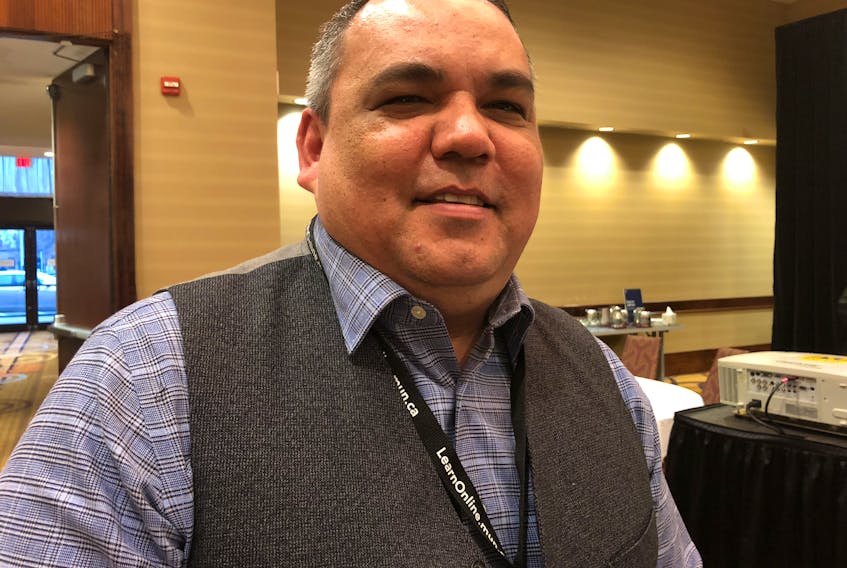Eugene Hart, the chief of Sheshatshiu, cried several times throughout his keynote speech at a suicide prevention conference in St. John’s Thursday evening.
“There’s always that gap that you’ll never be able to fill again,” he said, as he told the people gathered at the Signals of Hope national conference about his nephew and his sister – both died by suicide.
“We’re not the only families affected by this,” he said.
“It’s hard to live a normal life when we’re struggling in our community.”
Before becoming chief in 2015, Hart worked in social services as a community service worker with Child, Youth and Family Services and held various positions in Innu Education, including Innu-vice-principal with the school in Sheshatshiu.
With that background, he has a particular focus on addressing struggles young people face in the community.
“Working at a school, looking at kids being taken away – being flown to Saskatchewan (or) Ontario because of lack of support at home. And they’ll come back … a lot of kids lost their identity and their culture, and then they can’t fit in either their home, or they can’t fit in their community, and they commit suicide.”
Hart spoke about suicide rates in the community 14 times higher than the rate in Newfoundland.
“As our rates are high, the province decides to take away our recreational director’s salary. … We had to come up with the salary so we wouldn’t lose him because you’ve got to keep the kids active in town, and you don’t want to go back to 20 years ago, how there was an outrageous outbreak of gas sniffers in town. Sometimes I’m scared of that.”
He referred to the community as “the forgotten Innu.”
“The only time we will be recognized is if there’s a breakout of mental illness or there’s an emergency crisis in our community, then the funds are there … rather than for them to develop what we need in our community,” he said, though Hart acknowledged an improvement and said, “it’s getting there.”
Hart is working to bring children back to the community, and noted one of the ways they are making that happen is with the new group home that was announced in June. He said with that group home there have already been three young people reunited with the community.
He said it’s an important step in keeping children connected with their culture, and working toward a better future.

Studying suicide
Brian Mishara has his finger on the most recent progress and challenges associated with suicide prevention across Canada.
The founder of the Centre for Research and Intervention on Suicide and Euthanasia (CRISE) located in Quebec, where he has been the director since 1996, was the first to speak at the conference and he outlined his findings to the delegates.
The centre was renamed after the adoption of the Quebec law on medical assistance in dying.
In addition, he has been a professor in the psychology department at the University of Quebec since 1979 and an internationally renowned researcher in the field of suicidology.
Mishara has written many books on a variety of topics that include aging and medication consumption, suicide and euthanasia.
“I want to plant some seeds, to tell how I view suicide in Canada,’’ he said.
“Imagine a world without suicide. What would need to change? How would things be different?’’
He said suicide exists everywhere in the world and Canada’s suicide rates are among the highest globally.
Mishara said there are 800,000 suicides in the world each year, which far exceeds the deaths of wars and terrorist activities. More than 40 million people attempt suicide annually and the ratio of men to women is three to one.
“Elderly rates, 70 years and above are the highest and the next is middle-age men. We have universal health care, and mental-health counselling is supposed to be available to everyone, but that is more often not the case,’’ he said.
Finding out how to combat this issue is complex. Mishara said identifying who is most at risk and targeting these groups is key to helping.
He said there are far too few psychiatrists in the world. The majority of mental-health work is carried out by non-psychiatrists. Mishara said implementation research needs to be carried out in order to study and report on real-life situations like a genetic marker, an economic situation or a bad or unforeseen breakup.
He said those inequalities can increase vulnerabilities. A focus on teaching coping skills at a younger age and the use of new technologies to help people secure the help they need are just some of the ways he sees people getting help.
The two-day conference wraps up Friday.
Considered the premier suicide prevention knowledge exchange event in Canada, the conference brought together multiple voices, learning from and sharing with one another, including researchers, front-line clinicians, survivors of suicide loss, survivors of suicide attempts and family and friends who have been affected by suicide.
Access support
If you or someone you know is having a mental-health crisis, contact the Mental Health Crisis Line at 737-4668 or toll-free 1-888-737-4668.









